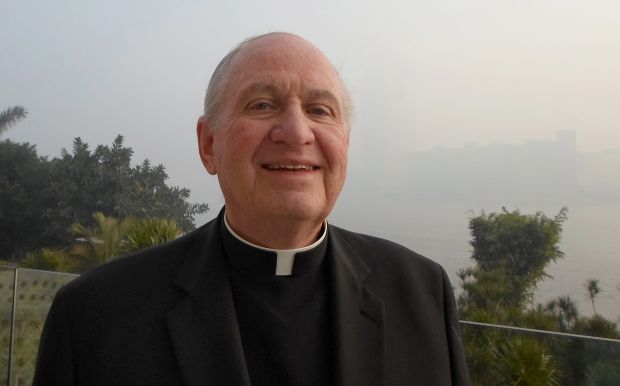CAIRO (CNS) — A U.S. bishop on a fact-finding trip to Egypt said he would tell policymakers back home that “the investment of our country in human projects is really going to be the most beneficial of all.”
“Sixty-eight percent of the population here live under the poverty level, and what they want … is to be full participants in the economy, in a way that really represents the dignity of the family and the person,” Bishop Richard E. Pates of Des Moines, Iowa, told Catholic News Service in Cairo Jan. 10.
The bishop, chairman of the U.S. bishops’ Committee on International Justice and Peace, said he had visited Cairo and the region around Assuit to see humanitarian aid projects funded by the U.S. Agency for International Development and by Catholic Relief Services, the U.S. bishops’ relief and development agency.
[hotblock]
The projects included activities to create employment and promote tolerance between Egypt’s Muslim and Christian communities, as well as projects to increase educational facilities for the country’s most vulnerable, the bishop said.
He said he also visited a CRS program in Cairo that is helping Syrian refugees find housing and jobs.
“What (the humanitarian projects in Egypt) are really doing is building infrastructure of human capital that will be of benefit to friendship and peace going forward,” Bishop Pates said.
Egypt, the Arab world’s most populous country, has stumbled on its path to democracy since the popular uprising that toppled President Hosni Mubarak in 2011.
Last July, the army overthrew Egypt’s first democratically elected president, Mohammed Morsi, after mass protests against him.
The tumultuous events have chased off tourists and investors, decimated the economy, and unleashed unprecedented violence in predominantly Sunni Muslim Egypt.
Some of the violence has targeted the nation’s Christian minority, thought to represent 10 percent of Egypt’s more than 85 million people.
At such times of instability, heightened fears, and growing poverty, U.S.-funded aid programs to Egypt are particularly critical, said Stephen Colecchi, director of the Office of International Justice and Peace of the U.S. Conference of Catholic Bishops, who was with Bishop Pates on the trip.
“One major issue that I see is that people are longing for stability,” Colecchi said.
“They are longing for a society in which Christians and Muslims live together in peace, and they repeatedly, both Christians and Muslims, kept declaring their mutual respect and love for each other and wanting to knit their society back together in a way that allows for everyone to have a place at the table,” Colecchi told CNS.
“U.S. government assistance is critical … because it helps reduce desperation, it helps people to live their daily lives (and) it helps the most vulnerable in society. If you want to build a more stable society, you need to address the poorest, most vulnerable members of that society to reduce desperation and to provide hope,” he said.
PREVIOUS: Pope: Too many Christians have watered-down hope, lukewarm faith in God
NEXT: With few words, Pope Francis shows a new way to be pro-life




Share this story